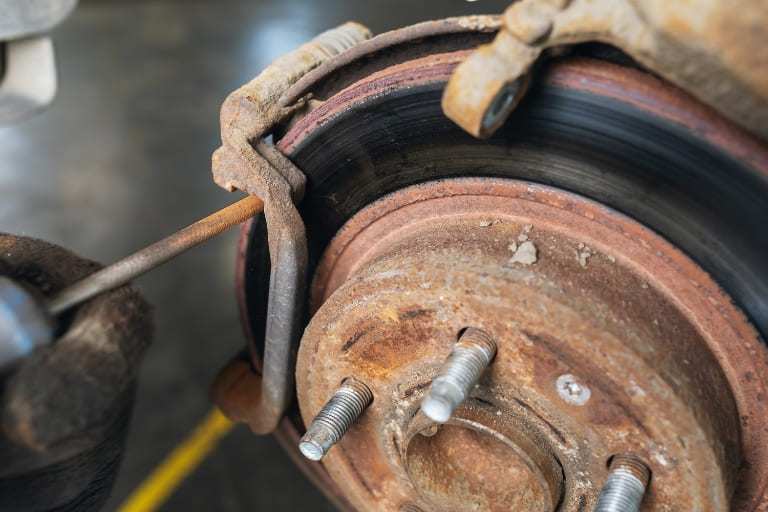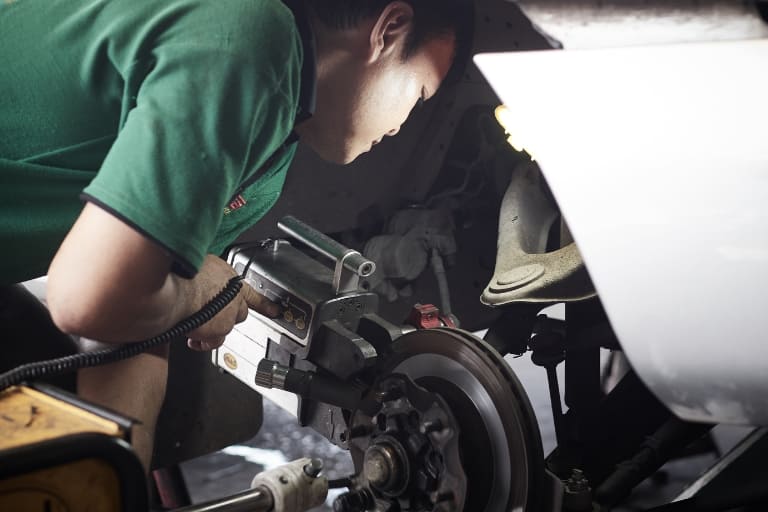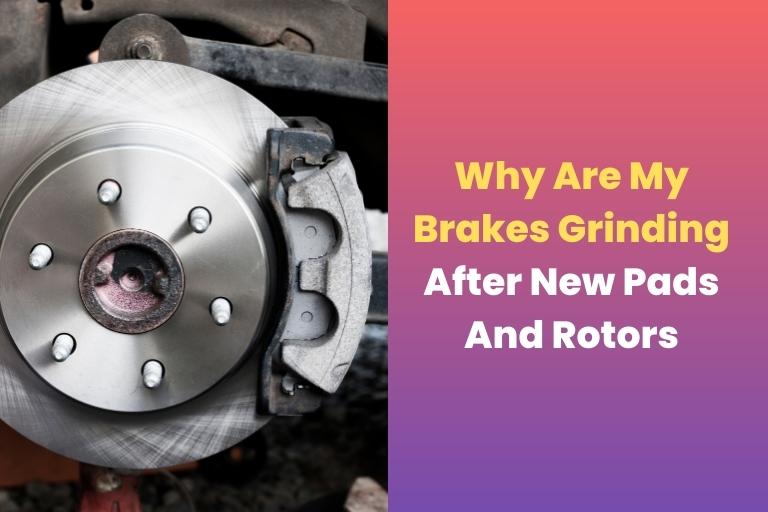Have you ever been frustrated by having new brake pads and rotors installed and later discovered that your brakes are still grinding? We’ve all been there, and it may be quite bewildering.
After all, you took the required precautions to safeguard the ty safety of your car by replacing worn-out components, but now you’re wondering what went wrong. So don’t worry!
In this blog article, we’ll look at the causes of that bothersome grinding noise coming from your brakes, even after installing a new set of pads and rotors. So strap in and join us as we solve this perplexing automotive conundrum!
Contents
- 1 Why are my brakes grinding after new pads and rotors?
- 2 Reasons for brakes grinding after new pads and rotors
- 3 How do I know if brakes are grinding after new pads and rotors?
- 4 How Do You Fix A Grinding Noise In Brakes?
- 5 What to Do After Replacing Brake Pads and Rotors to Avoid Grinding Noise?
- 6 Frequently Asked Questions
- 7 Conclusion
Why are my brakes grinding after new pads and rotors?

Even after replacing the brake pads, we can’t help but wonder why the grinding is still occurring. Let us start by answering this question for you.
It is crucial to recognize that brake pad grinding after restoration might occur for a variety of reasons. One of the most common reasons is that the pads need to be bedded in. Another potential issue is that the brake pads are not correctly installed.
Low lubrication, malfunctioning brake calipers, low-quality brake pads, broken rotors, or simply debris caught between the pads and rotors might all be potentially responsible for the grinding brakes after new pads and rotors. Or, in rare circumstances, brakes might grind because something is stuck between the pad and the rotor.
Let us dive more into the article’s depth to understand each cause in detail. We will also recommend some methods to fix this issue.
Reasons for brakes grinding after new pads and rotors
The following are the most common causes of brake grinding after replacing pads and rotors:
The Pads Must Be Bedded In:
One of the most common reasons for brake grinding following the installation of new pads and rotors is that the pads must be bedded in.
But what exactly does bedding mean? The process of conditioning the new pads to work with the rotors is known as bedding.
This happens naturally while driving and using the brakes, so you may anticipate the ranting to linger for a few dozen miles.
However, if the ranting does not become quieter with time, there may be another cause for the grinding.
The Brake Pads Aren’t Seated Properly:
The brake pads are not properly seated could also be a cause of this difficulty. When you press your car’s brake pedal, the calipers strain the pads to rub against rotors, generating friction. This friction is what causes your automobile to slow or stop. Proper pad seating is critical to ensuring the pads make full contact with the rotors.
If the pads do not contact the rotors completely, your brakes will be less effective, and your car will take longer to stop. Furthermore, if your brake pads aren’t correctly installed, they might wear out early and produce a grinding sound.
Foreign Objects:
The brake pads might grind when anything becomes lodged between the pad and the rotor. This is usually a little piece of garbage or stones that has been lodged in there.
You may get rid of the foreign item by driving backward or in reverse for about 50 feet, letting it to exist in the same way it came in.
You can also use pliers to try to remove the foreign object. You must use some force if you can’t get the thing out or it appears trapped. But make sure you do not harm or damage other nearby components.
Poor Quality Replacement Brakes:
Installing low-quality brakes can also cause grinding, as this will prevent the pads from making appropriate contact with the rotors. This will produce a grinding sound and limit the efficacy of your brakes.
The ideal solution is to replace the brakes with a higher-quality pair. We understand that spending even more money isn’t ideal, especially considering you just changed the brakes, but it’s better than driving about with substandard brakes.
Improper Lubrication:
Failure to lubricate the caliper slider pins may be the source of this aggravating problem. When these pins seize, the brake pads cannot retract correctly when you release the brake pedal.
As a result, the pads rub against the rotors, causing the grinding sound and premature pad wear. It’s a minor but critical step in the brake replacement procedure that may save you time and money.
A Worn-Out Wheel Bearing:
Another probable cause of brake grinding is a worn-out wheel bearing. The wheel bearing is responsible for allowing the wheel to freely rotate. When the wheel wears out, it can no longer rotate freely, resulting in a grinding noise.
A worn-out wheel bearing can cause the steering wheel to tremble and grind. If you suspect your wheel bearing is worn, contact a specialist as soon as possible.
Improperly Installed Brake Dust Cover:
The brake dust cover is a cylindrical metal component that fits between the braking rotor and the wheel. When you apply pressure on the brake pedal, the brake pads clamp down on the brake rotors, causing your vehicle to slow down or stop.
The brake dust cover keeps debris and other particles out of this region, preventing them from interfering with the braking process.
If your new brakes are grinding, the brake dust cover may not be correctly seated. When this occurs, it might generate a vibration that causes your brakes to screech when you apply them.
Misaligned Brake Spring:
A misaligned brake spring is another typical cause of ranting brakes. The brake pads will tremble against the rotors if the brake spring is not in a proper alignment. This vibration then causes screeching sounds.
How do I know if brakes are grinding after new pads and rotors?

After installing new brake pads and rotors, it’s vital to check to see whether your brakes are grinding.
Here are a few quick techniques to see whether there’s a problem:
Keep an ear out for grinding noises:
Pay attention to any strange sounds coming from your brakes. When you press the brakes, you may hear a grinding noise, which might signal a problem. Grinding usually indicates metal-on-metal contact, which indicates that something is wrong.
Feel for vibrations:
Pay attention to any vibrations or pulsations when you push the brake pedal. Excessive vibrations might indicate uneven brake pad wear or a misaligned rotor, resulting in an unpleasant grinding feeling.
Check the brake fluid level:
Keep an eye on the brake fluid level in your car. It may signal a leak or other problems if it is much lower. Insufficient brake fluid can cause grinding and limit braking performance.
How Do You Fix A Grinding Noise In Brakes?
Here is a simple step-by-step guide that you can follow to fix the grinding noise coming from your brakes by yourself:
Step 1: Determine which wheel is causing the problem
Determine the source of the sound. It would be best to locate the wheel whose brake pad produces noise.
Step 2: Remove the wheel and brake caliper
Remove the wheel with a wrench and carefully inspect the braking caliper and wheel. Look to the wheel to help you figure out what’s wrong.
Step 3: Inspect Brake Pads and Rotor
Begin by inspecting and measuring the thickness of the brake pads. New brake pads will be 3/8 to 1/2-inch thick. You should replace them when they are down to 1/4-inch. However, you will likely hear grinding noises once the pad is 1/8-inch thick, or 20 to 25% of its original thickness.
The rotor examination will be unique. You’re not interested in how much thickness remains but in how the surface appears. The rotor surface should be smooth and free of flaws. If the metal surface has warped or been damaged, it is time to resurface or replace it.
Note: Replacement of brake pads and rotors should be done in pairs.
Step 4: Look For Stuck Stones Or Broken Shims
Small stones and debris are unlikely to damage the brake rotor. Instead, as long as you can tolerate the noises, they will automatically release the brakes from normal functioning. If you can’t stand the noises or are concerned about the size of the stones, you should remove them yourself.
Small stones and debris are unlikely to damage the brake rotor. Instead, as long as you can tolerate the noises, they will automatically release the brakes from normal functioning. If you can’t stand the noises or are concerned about the size of the stones, you should remove them yourself with the help of pliers.
Step 5: Contact A Professional
You should not be probing around looking for solutions if you are unfamiliar with the braking system. It is preferable to leave the diagnosis and repair to the experts. Consult a competent technician to repair your issue without allowing it to worsen and cost you a lot of money in upkeep.
What to Do After Replacing Brake Pads and Rotors to Avoid Grinding Noise?
After replacing brake pads and rotors, you should follow these steps to ensure avoiding grinding noise:
- Check whether the brakes are properly bedded-in
- Check and adjust caliper slider pins
- Inspect and properly seat the brake dust cover
- Verify proper rotor installation
- Monitor brake fluid level and quality
- Test drive and listen for any abnormal sounds
Frequently Asked Questions
How long do new brakes grind?
New brakes must be broken in with use and may generate a grinding or ranting noise immediately. However, when the brakes wear in, you should notice that the grinding sound disappears after a few weeks. If the grinding continues after roughly 50 miles, consider returning your vehicle to the shop for inspection.
Is it normal for new brakes and rotors to grind?
No. Grinding is not usual for new brakes and rotors. Grinding brakes with new pads and rotors might occur due to inadequate lubrication, malfunctioning brake calipers, low-quality brake pads, broken rotors, or simply debris caught between the pads and rotors. If you are experiencing this problem, it is best to have a mechanic inspect your brakes to find the source of the grinding.
Why do my new brakes sound like metal on metal?
Due to poor brake pad installation, a lack of lubrication on caliper pins, or a misaligned brake dust cover, new brakes may sound like metal on metal. Solving these concerns immediately is critical to prevent further damage and maintain a quieter braking feel.
Why are my brakes grinding, but the pads are good?
If your brakes are grinding yet your pads are in good condition, it might be due to worn-out rotors, a faulty caliper, or debris trapped between the rotor and pad. An expert inspection is recommended to diagnose and address the problem.
You May Also Like the following:
- How Close Should Brake Pads Be To Rotors?
- Can You Spray Brake Cleaner On Brake Pads? Does It Help?
- Can You Put Brake Pads On Backward? Why Should You Avoid?
- Brake Shudder After New Rotors And Pads? Here Is The Fix
- Are Brake Pads Interchangeable? Let’s Find Out
- Does The Emergency Brake Lock All Wheels?
- How Long Can You Drive On Grinding Brakes?
- Do Ceramic Brake Pads Contain Asbestos?
- Can You Use Front Brake Pads On The Rear?
- Why Does My Car Shake After Changing the Brake Pads?
- Should You Replace All 4 Brake Pads At Once?
- How to Install Anti-Rattle Clips on Brake Pads: Beginner’s Guide
- How Long Do Brake Pads Last: Brake Pad Lifespan Explained
- Driving Without Brake Pads: How Long is Safe?
- Fixing New Ceramic Brake Pads Making a Grinding Noise
- Ceramic vs. Semi-Metallic Brake Pads: Which is Better?
- Ceramic vs OEM brake pads+
- Ceramic vs Organic Brake Pads: In-depth Comparison
- Ceramic vs Carbon Fiber Brake Pads: A Comprehensive Comparison
Conclusion
In conclusion, if you’re hearing grinding noises after installing new brake pads and rotors, there might be various causes. It might be a result of insufficient bedding-in, wrong brake pad seating, foreign objects, low-quality replacements, a lack of lubrication, worn-out wheel bearings, a misaligned brake dust cover, or a misaligned brake spring.
If you suspect your brake pads are ranting, check for strange sounds, feel for vibrations, and check the brake fluid level to see whether your brakes are grinding.
It is critical to address the precise cause of the issue and understand it well to resolve it.. Avoiding grinding noises and maintaining maximum brake performance by following appropriate installation techniques, performing regular maintenance, and getting professional assistance when necessary.
